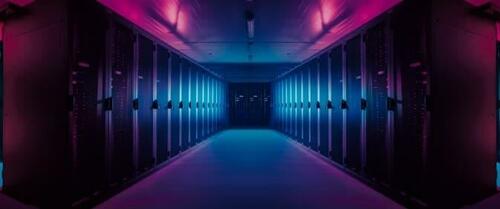Authored by Felicity Bradstock via OilPrice.com,
-
The rapid growth of data centers to support AI is significantly increasing global electricity demand.
-
This surge in demand threatens to outpace the development of renewable energy sources.
-
International regulations are needed to ensure tech companies use clean energy and minimize their impact on climate goals.
The global electricity demand is expected to grow exponentially in the coming decades, largely due to an increased demand from tech companies for new data centers to support the rollout of high-energy-consuming advanced technologies, such as artificial intelligence (AI). As governments worldwide introduce new climate policies and pump billions into alternative energy sources and clean tech, these efforts may be quashed by the increased electricity demand from data centers unless greater international regulatory action is taken to ensure that tech companies invest in clean energy sources and do not use fossil fuels for power.
The International Energy Agency (IEA) released a report in October entitled “What the data centre and AI boom could mean for the energy sector”. It showed that with investment in new data centers surging over the past two years, particularly in the U.S., the electricity demand is increasing rapidly – a trend that is set to continue.
The report states that in the U.S., annual investment in data center construction has doubled in the past two years alone. China and the European Union are also seeing investment in data centers increase rapidly. In 2023, the overall capital investment by tech leaders Google, Microsoft, and Amazon was greater than that of the U.S. oil and gas industry, at approximately 0.5 percent of the U.S. GDP.
The tech sector expects to deploy AI technologies more widely in the coming decades as the technology is improved and becomes more ingrained in everyday life. This is just one of several advanced technologies expected to contribute to the rise in demand for power worldwide in the coming decades.
Global aggregate electricity demand is set to increase by 6,750 terawatt-hours (TWh) by 2030, per the IEA’s Stated Policies Scenario. This is spurred by several factors including digitalization, economic growth, electric vehicles, air conditioners, and the rising importance of electricity-intensive manufacturing. In large economies such as the U.S., China, and the EU, data centers contribute around 2 to 4 percent of total electricity consumption at present. However, the sector has already surpassed 10 percent of electricity consumption in at least five U.S. states. Meanwhile, in Ireland, it contributes more than 20 percent of all electricity consumption.
While the speed and manner in which AI use will grow remains uncertain, and efficiency improvements are expected to be made, electricity demand from data centers, cryptocurrencies, and AI could reach as much as 1,000 Terawatt Hours (TWh) in 2026 – roughly equivalent to the electricity consumption of Japan – compared to 460TWh today, the IEA predicts.
The organization calls for more public-private dialogue, with policymakers, the tech sector, and the energy industry coming together for discussions to manage both expectations and energy use. Greater international regulation of the tech sector is required to ensure that the growing electricity demand for data centers does not outweigh the green transition achievements currently being seen worldwide.
There are growing fears that, if left unregulated, the electricity consumption of data centers could surpass the electricity demand of some U.S. cities or even states. Many data center developers are concerned about finding enough land to house new sites and enough clean power to run them. The facilities could increasingly require 1 GW of power or more, which is equivalent to around twice the 2023 residential electricity consumption of Pittsburgh.
The president of Lancium, a company that secures land and power for data centers in Texas, Ali Fenn, explained that U.S. tech companies are in the “race of a lifetime to global dominance”. Fenn said, “They’re going to keep spending” because there’s no more profitable place to deploy capital.
At the rate the advanced technologies are expanding, renewable energy sources will not be sufficient to meet the growing demands of the tech industry. Many tech companies are expected to use natural gas to power operations, particularly in the U.S. where the gas sector is set to continue expanding rapidly.
Currently, many tech companies operate data centers with a capacity of around 40 MW. However, in the coming years, more firms are expected to invest in campuses of 250 MW or more. As a growing number of campuses of 500 MW or more emerge in the 2030s and 2040s, which is equivalent to the power needed for 350,000 homes, this could lead to a surge in demand for gas-generated electricity, following years of national investment in a green transition.
While the U.S. is expected to see the greatest data center expansion in the coming decades, Europe's data center power consumption is expected to nearly triple by the end of the decade. Meanwhile, China has invested over $6.12 billion in a national project to develop data centers in recent years, according to a senior government official.
A joined-up approach to regulating the energy usage of data centers is required to prevent the anticipated rise in electricity demand from challenging the progress of the global green transition. Governments worldwide must establish clear regulations and limits on the energy use of tech companies for advanced technologies, such as AI, if they hope to meet Paris Agreement climate pledges. This may include requiring tech companies to fulfill their energy needs through clean energy sources, such as renewables and nuclear power, as well as slowing the pace of deployment of these technologies.
